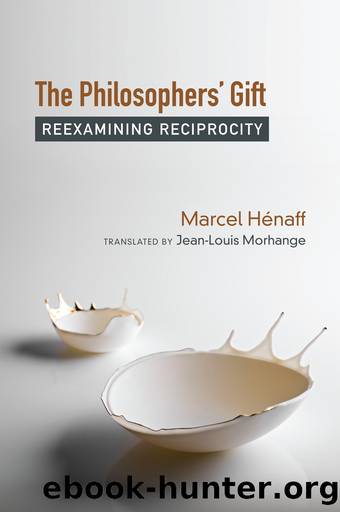The Philosophers' Gift by Marcel Hnaff;

Author:Marcel Hnaff;
Language: eng
Format: epub
Publisher: Lightning Source Inc. (Tier 2)
Published: 2020-07-15T00:00:00+00:00
CHAPTER 7
Philosophy and Anthropology: With Lefort and Descombes
The questioning we have developed so far on the relationships between the gift and reciprocity has focused primarily on authors from the phenomenological tradition. The reason why now appears more clearly: There has been a kind of diffuse attraction between the motif of the givenness of phenomena—the understanding of the world as given—and the gift as a gesture, whatever its modalities. Among the many misunderstandings caused by those associations or assimilations, the most embarrassing involves the reference to Mauss’s The Gift, which has been subjected to criteria of assessment without any relevance to its own field of knowledge: practices of symbolic exchanges among traditional groups. It is therefore urgent to problematize more precisely the possible relationships between philosophy and social anthropology from the perspective of gift exchanges. In France few philosophers have attempted this effort. Two of them seem especially interesting for our discussion because of their original relationship to Mauss’s The Gift: Claude Lefort and Vincent Descombes. Their perspectives are very different. Lefort supports his reflection on the political realm and history based on the social sciences, whereas Descombes questions the validity of the concepts of those sciences, beginning with the concepts of society and social relationship. It remains to be determined how their respective readings of Mauss’s writing contribute to the development of their projects and shed light on our own questioning.
Let us recognize that reading their works after those of Derrida, Levinas, and Marion gives us the feeling we have moved to a different planet (less so in Ricoeur’s case), whether in terms of style, method, or field. This involves first of all a change in perspective on what is called the social realm, a very broad concept that only the context defined by a specific debate can circumscribe. In the phenomenological approach society as a collective reality and object of thought can be approached only as the experience of a subject. The existence of the group is thus considered based on the presupposition of the autonomy of the Self, which opens a transcendental intersubjectivity. On a more fundamental level this presupposition also determines the type of relationship that any subject can have with Others in general, and with “the others” as members of the group.1
The question of the social bond is at the core of Lefort’s and Descombes’s inquiries. It is not enough to ask what unites a group, preserves its unity, and makes it view itself as forming a unique whole (this is the question of the community and its identity). Lefort examines whether seeking this bond entirely absorbs the energy of the members of the group and determines their choices and actions, while Descombes attempts to answer a more general question: How can an individual subject relate to another and view this relationship as being as evident and fundamental as his/her own existence? What makes it possible for a Self to bond with Others? Can this bond provide a sufficient basis to define the social fact? If
Download
This site does not store any files on its server. We only index and link to content provided by other sites. Please contact the content providers to delete copyright contents if any and email us, we'll remove relevant links or contents immediately.
What's Done in Darkness by Kayla Perrin(25499)
Shot Through the Heart: DI Grace Fisher 2 by Isabelle Grey(18219)
Shot Through the Heart by Mercy Celeste(18160)
The Fifty Shades Trilogy & Grey by E L James(17774)
The 3rd Cycle of the Betrayed Series Collection: Extremely Controversial Historical Thrillers (Betrayed Series Boxed set) by McCray Carolyn(13189)
The Subtle Art of Not Giving a F*ck by Mark Manson(12912)
Scorched Earth by Nick Kyme(11831)
Stepbrother Stories 2 - 21 Taboo Story Collection (Brother Sister Stepbrother Stepsister Taboo Pseudo Incest Family Virgin Creampie Pregnant Forced Pregnancy Breeding) by Roxi Harding(11040)
Drei Generationen auf dem Jakobsweg by Stein Pia(10216)
Suna by Ziefle Pia(10185)
Scythe by Neal Shusterman(9259)
International Relations from the Global South; Worlds of Difference; First Edition by Arlene B. Tickner & Karen Smith(8608)
Successful Proposal Strategies for Small Businesses: Using Knowledge Management ot Win Govenment, Private Sector, and International Contracts 3rd Edition by Robert Frey(8419)
This is Going to Hurt by Adam Kay(7694)
Dirty Filthy Fix: A Fixed Trilogy Novella by Laurelin Paige(6453)
He Loves Me...KNOT by RC Boldt(5804)
How to Make Love to a Negro Without Getting Tired by Dany LaFerrière(5378)
Interdimensional Brothel by F4U(5304)
Thankful For Her by Alexa Riley(5161)
